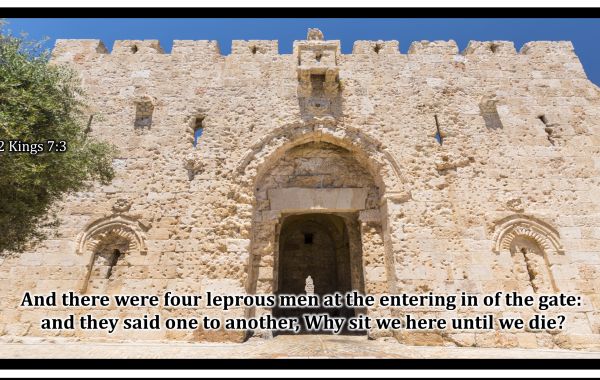Lepers Dying At the Gate
Background
This story takes place around 850 BC, and about 200 years after King David. It occurs in the during the divided kingdom of Israel in the Northern Kingdom of Samaria, which is ruled by Joram, the son of King Ahab and Queen Jezebel. Ahab is dead but Jezebel is still living.
During this time the Kingdom of Syria is rising in power and looking for other kingdoms to conquer. The King of Syria is Benhadad and he has besieged the capital city of Samaria. The siege is very long with no food being allowed into the city and the conditions inside the city walls are shocking in their horror.
The Famine 2 Kings 6:25-29 And there was a great famine in Samaria: and, behold, they besieged it, until an ass's head was sold for fourscore pieces of silver, and the fourth part of a cab of dove's dung for five pieces of silver. 26 And as the king of Israel was passing by upon the wall, there cried a woman unto him, saying, Help, my lord, O king. 27 And he said, If the LORD do not help thee, whence shall I help thee? out of the barnfloor, or out of the winepress? 28 And the king (Joram) said unto her, What aileth thee? And she answered, This woman said unto me, Give thy son, that we may eat him to day, and we will eat my son to morrow. 29 So we boiled my son, and did eat him: and I said unto her on the next day, Give thy son, that we may eat him: and she hath hid her son.
The Four Lepers. 2 Kings 7:3-4 And there were four leprous men at the entering in of the gate: and they said one to another, Why sit we here until we die? 4 If we say, We will enter into the city, then the famine is in the city, and we shall die there: and if we sit still here, we die also. Now therefore come, and let us fall unto the host of the Syrians: if they save us alive, we shall live; and if they kill us, we shall but die.
In the midst of this terrible national catastrophe, the Bible and God shift focus to the outside the city, to the city gates. From the most important person to the least important, from the King to four unnamed, unknown, unimportant lepers.
Customarily, the lepers would have been fed by their friends or relatives in the city, but now, because of the famine, there is no food for anyone in the city, much less the lepers outside the city.
The four have a discourse and in the course of that discussion, they realize they must do something. They had 3 choices.
They could stay where they were. They could complain or wail or wish things weren’t the way they were. That there was no war, no famine, no siege. They could just sit there in their present condition, and if they did that, then they knew they would die, slowly perhaps but they would die.
Alternatively, They could try and go to another city, leave the problems of this location behind them, but they knew that they Syrians had invaded all the Kingdom. War and famine were everywhere and besides they would still be who they were, starving lepers. Going to another place wouldn’t change that. They would just be taking their problems with them to a new location.
The Third choice, they could go into the camp of the Syrians! Now that was a wild and bold idea. Instead of avoiding or ignoring the problem they would instead go into the very teeth of the problem by walking into the Syrian camp.
Why did they choose this? Yes, they were desperate, but their course of action makes sense. They understood that to remain inactive was a sure death, but to move, to take action, even take a risk was the surest means of a chance at life.
Lethargy At The Gait
There are so many applications in our lives to these lepers who made the decision to not sit still and die.
You could apply it to physical life. They tell us and I believe it that sitting all day long is worse for your health than smoking a cigarette. If you want to have better health then you got to get up and move. If you sit too long, you’ll die instead of live long.
You could apply it to your mental life. The best thing to avoid Alzheimer’s, dementia, Parkinson’s, depression, anxiety, stress and the list goes on, is to exercise, especially to get out of the house, into the fresh air and walk, bike, run in the sunshine, trees and grass.
But we are here to talk about our spirit, that part of us that God breathed into Adam and the application is even stronger when we speak of spirituality. When it comes to the people of God, the church of God and the service of God, sitting still means death. It may come slowly but if we aren’t moving, risking, striving, serving then we are dying.
Here is the principle we find in God’s word, here and all through the Bible, “Standing still is simply dying slowly.”
It’s true in our physical health, it true in our church and its true our relationship with the Lord. If you’re not moving, you’re dying.
This is what God’s word tells us. We are commanded to grow, to change, to not stand still.
2 Peter 3:18 But grow in grace, and in the knowledge of our Lord and Saviour Jesus Christ. To him be glory both now and for ever. Amen.
Philippians 3:13-14 Brethren, I count not myself to have apprehended: but this one thing I do, forgetting those things which are behind, and reaching forth unto those things which are before, I press toward the mark for the prize of the high calling of God in Christ Jesus.
Here at Calvary Baptist and in our own lives, we’ve got to keep asking, keep seeking, keep knocking. Looking and moving from one opportunity to the next. It’s not as simply as it was in the past, but at least we’re not at war and suffering through a famine. I could be a lot worse, and we have to face the challenges and make use of the opportunities God gives us.
I don’t exactly what will work or what the future holds, but one thing is absolutely sure, “You can’t sit still.”








